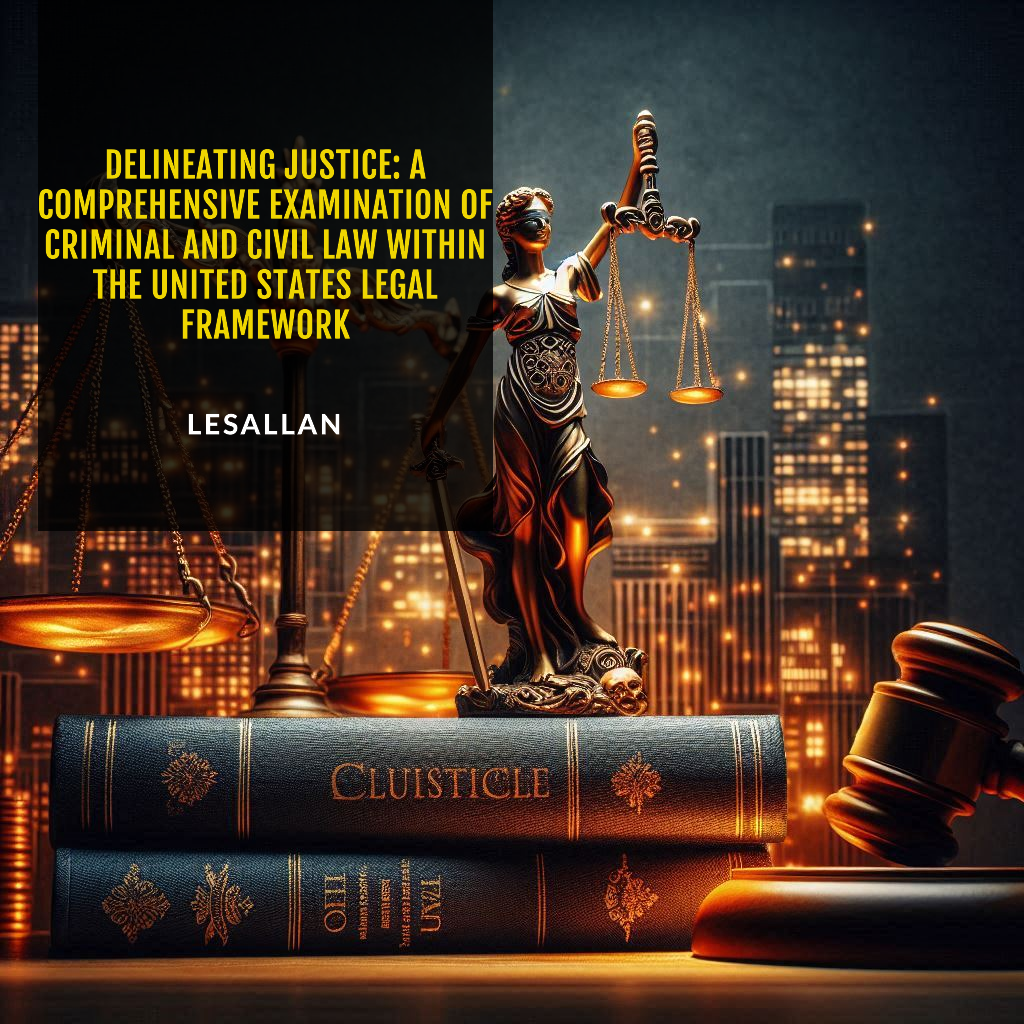Lesallan – July 14, 2024
Ohio Christian University
CJU1010 Introduction to Justice Systems (ONL24F1)

Delineating Justice: A Comprehensive Examination of Criminal and Civil Law within the United States Legal Framework
The legal system of the United States is comprised of two distinct branches: criminal law and civil law. Every branch serves a distinct purpose and operates according to its unique set of principles. Criminal law is concerned with addressing offenses against the state, such as theft, assault, and murder, with the objective of holding individuals accountable for their actions. Conversely, civil law focuses on resolving disputes between individuals or organizations and prioritizes the provision of remedies, such as compensation, for any harm caused. A comprehensive understanding of the disparities between these two branches is crucial for a thorough comprehension of the American legal system and for ensuring the equitable administration of justice in various legal contexts.
Criminal law encompasses actions that constitute offenses against the public, society, or the state, even if an individual is the immediate victim (Legal Information Institute, 2024). These offenses encompass, among others, murder, assault, theft, and driving under the influence (Legal Information Institute, 2024). Criminal proceedings are initiated by the federal or state government (the prosecution) and are consistently adjudicated by a jury (Legal Information Institute, 2024). The prosecution bears the burden of proving the defendant’s guilt “beyond a reasonable doubt” (Legal Information Institute, 2024). Serious (felony) charges typically result in imprisonment, although they may also entail a fine payable to the government (Legal Information Institute, 2024).
The field of civil law pertains to matters involving harm inflicted upon an individual or another private entity, such as a corporation (Legal Information Institute, 2024). These matters encompass actions like defamation (libel and slander), breach of contract, negligence leading to injury or death, and property damage (Legal Information Institute, 2024). Civil cases are initiated by a private party (the plaintiff) and are typically adjudicated by a judge (Legal Information Institute, 2024). The plaintiff bears the burden of demonstrating the defendant’s liability based on the “preponderance of evidence” (Legal Information Institute, 2024). Typically, penalties in civil cases entail monetary compensation and expressly exclude incarceration (Legal Information Institute, 2024).
The Fifth Amendment of the U.S. Constitution provides protection against double jeopardy, prohibiting individuals from being tried for the same crime more than once. It is important to emphasize that this safeguard pertains specifically to criminal cases. Consequently, an individual who has been acquitted or convicted of a crime may still be liable to face a civil lawsuit concerning the same behavior.
The book “CJ: Realities and Challenges” by Ruth E. Masters et al. (2021) provides a comprehensive analysis of the daily realities and challenges within the criminal justice system. Published by McGraw Hill in 2021, this scholarly work invites readers to critically engage with the subject matter. According to Masters et al. (2021), the publication presents a structured approach to observing, investigating, and comprehending the intricacies of the criminal justice system. The text aims to guide students in dispelling misconceptions and developing a profound understanding of its multifaceted nature.
In summary, the differentiation between criminal law and civil law is fundamental to the American legal system. Each branch serves a distinct purpose and operates under unique guiding principles. Understanding these variances is essential not only for legal professionals but also for citizens, as it empowers them to maneuver the legal landscape more adeptly. As a student of justice systems, I consider this knowledge to be priceless. It deepens my comprehension of various offenses, their impact on victims, and the notion of victimless crimes. Moreover, it resonates with my principles of seeking wisdom and guidance from the Bible, emphasizing the significance of justice and equity in society. I am appreciative of the opportunity to explore this subject and eagerly anticipate applying this knowledge in my forthcoming studies and career within the realm of justice.
References:
Legal Information Institute. (2024). Criminal law. Cornell Law School. Retrieved July 4, 2024,
from https://www.law.cornell.edu/wex/criminal_law
Legal Information Institute. (2024). Civil law. Cornell Law School. Retrieved July 4, 2024, from
https://www.law.cornell.edu/wex/civil_law
Legal Information Institute. (2024). Double jeopardy. Cornell Law School. Retrieved July 4,
2024, from https://www.law.cornell.edu/wex/double_jeopardy
Masters, R. (2021). CJ: realities and challenges. Mcgraw-Hill Education.



1 Comment
Search Engine · July 17, 2024 at 9:14 pm
Love the energy! Custom Song That Tells Your Story
Comments are closed.